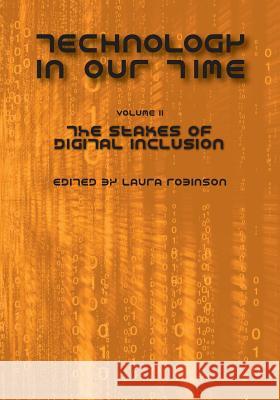Technology in Our Time (Volume II): The Stakes of Digital Inclusion » książka
Technology in Our Time (Volume II): The Stakes of Digital Inclusion
ISBN-13: 9781621317319 / Angielski / Miękka / 2013 / 260 str.
The four book series Technology in Our Time thoughtfully examines a broad range of topics and issues central to the study of new media.
Volume II: The Stakes of Digital Inclusion examines patterns of differentiated use that characterize participation in the Information Society. The digital divide may be rooted in race, class, gender, level of education, age, or ability. The volume moves from a discussion of one society digitally divided, to seeking solutions that enable the bridging of that divide. Through the readings students will learn about the internet and social inequalities, the digital production gap, and differing usage patterns in rural and urban societies. In a time when digital access and inclusion can easily be taken for granted, this volume provides an eye-opening look at the importance of such inclusion, and the potential consequences of exclusion.
Laura Robinson earned her Ph.D. in Sociology from the University of California, Los Angeles. Currently, she is an Assistant Professor in the Sociology Department at Santa Clara University. Professor Robinson held a postdoctoral fellowship at the University of Southern California's Annenberg Center, and her research has been funded by the MacArthur Foundation. Her research has focused on new media, digital inequality, and comparative research on The United States, Europe, and Latin America.
Professor Robinson has published in several peer-reviewed journals, including Sociology, Qualitative Sociology, The Journal of Computer-Mediated Communication, and Information, Communication, and Society. Her article The Cyberself, published in New Media & Society, was awarded the Outstanding Paper Award by the Computer Information Technology Section of the American Sociological Association. Professor Robinson's work on Brazilian, French, and American online political forums has won awards from the Computer Information Technology Section of the American Sociological Association, the Association of Internet Researchers, and the International and Intercultural Communication Division of the National Communication Association."











